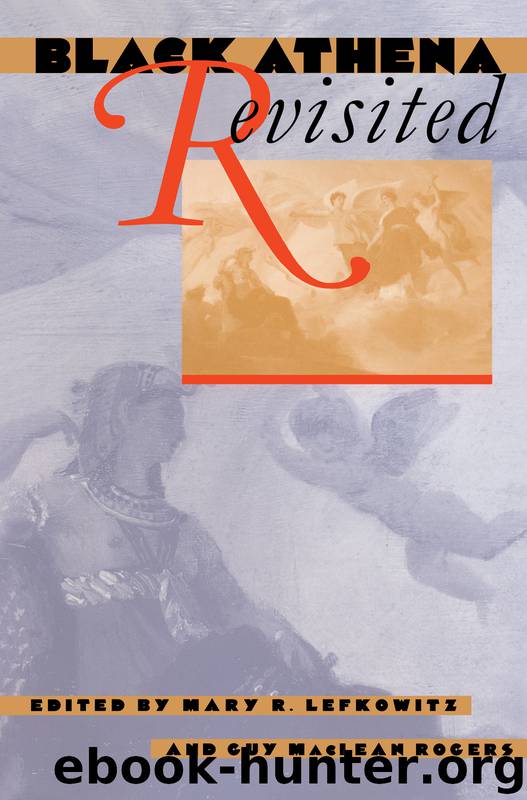Black Athena Revisited by Mary R. Lefkowitz & Guy MacLean Rogers

Author:Mary R. Lefkowitz & Guy MacLean Rogers
Language: eng
Format: epub
Publisher: The University of North Carolina Press
Published: 1996-03-12T16:00:00+00:00
Greece
The World Turned Upside Down
Emily T. Vermeule
Martin Bernal’s first volume of Black Athena, published in 1987, brought him instant fame as a defender of Semitic peoples and cultures against German Aryan propagandists and other anti-Semites of the nineteenth and twentieth centuries. At the same time Bernal became, as he apparently hoped, the chief intellectual antagonist of those who have over the centuries refused to acknowledge the contributions that black Africa has made to the development of ancient Greek and Roman civilizations and therefore to European civilization and to the Eurocentric education of Americans. Egypt, as a geographical mediator between Africa and the Mediterranean, was said by Bernal to be both black and Semitic.
That first volume of Black Athena contained some excellent, if brief, nineteenth-century historiography, especially of anti-Semitic German and French scholarship, and sketched the intellectual climate of the several generations between about 1780 and 1940. Bernal was able to select a number of striking quotations from scholars of classical antiquity which might now seem prejudiced, tasteless, laughable, or simply misinformed.
Yet even for eager readers of the first volume of Black Athena it was not always easy to understand the nature of the anti-Semitism that so angered Bernal. Friedrich August Wolf, in his Prolegomena to Homer, was charged with representing the Iliad and the Odyssey as oral poetry, a “Romantic” sin in Bernal’s view (BA 1:283–85). George Grote influenced the teaching of history unfairly by beginning with the first Olympic Games in 776 B.C.E. and thereby excluding the Egyptian and Phoenician contributions to Greek culture in the Bronze Age (1:326–30)—though the Bronze Age was not known yet in 1846 (see Rogers, this volume). Thomas and Matthew Arnold were wrong to admire the classics, and German education, and ought not to have promoted “Victorian Hellenism” (1:347–48). J. B. Bury was at fault when he described the Spartans as refusing to intermarry with their helots, thus keeping their blood “pure” (1:293). Carl Blegen was wrong to suggest that Greece and Asia Minor may have shared common place names like Parnassus; he should have looked first to Egypt and Phoenicia (1:391–92). Rhys Carpenter was wrong—and had “sinister” motives—when he suggested that the Greeks did not adopt the Phoenician alphabet before the eighth century B.C.E. (1:395–97).
Still, even when they were puzzled, many scholars were attracted to the apparently evenhanded and refreshing survey in BA 1, with its often justifiable condemnation of the narrow-minded teaching of the classics that assumed the cultural superiority of the Greeks without reference to Egypt and the East. They waited with anticipation for the second volume, which was to offer the archaeological documentation for the belief that Egypt and the Levant inspired the culture of the Greeks.
Greek culture has often been perceived as “special,” and this has caused resentment in regions of the world whose art and literature and philosophy have not been so acclaimed. The first volume of Black Athena was a thoughtful exposé of how eminent German scholars like Wilhelm von Humboldt felt that “the Greeks” were superior:
Download
This site does not store any files on its server. We only index and link to content provided by other sites. Please contact the content providers to delete copyright contents if any and email us, we'll remove relevant links or contents immediately.
| Africa | Americas |
| Arctic & Antarctica | Asia |
| Australia & Oceania | Europe |
| Middle East | Russia |
| United States | World |
| Ancient Civilizations | Military |
| Historical Study & Educational Resources |
Mythos (2019 Re-Issue) by Stephen Fry(1565)
Alexander the Great by Robin Lane Fox(1357)
On Sparta (Penguin Classics) by Plutarch(1188)
Antigone Rising: The Subversive Power of the Ancient Myths by Helen Morales(1135)
Persian Fire by Tom Holland(1080)
The Last Days of Socrates by Plato & Christopher Rowe & Plato(1013)
The Classical World: An Epic History From Homer to Hadrian by Robin Lane Fox(1006)
Cicero by Anthony Everitt(987)
The Athenian Constitution (Classics) by Aristotle(940)
Antigone Rising by Helen Morales(841)
The Greek World(817)
The Riddle of the Labyrinth(816)
The Story of the Greeks (Yesterday's Classics) by Guerber H. A(785)
The Homeric Hymns (Penguin Classics) by Homer(754)
The End of the Bronze Age by Robert Drews;(744)
The Eudemian Ethics (Oxford World's Classics) by Kenny Anthony(741)
Guide to Greece by Pausanias(726)
A History of My Times (Classics) by Xenophon(703)
Lords of the Sea: The Epic Story of the Athenian Navy and the Birth of Democracy by John R. Hale(701)
